Hungarian Prime Minister Viktor Orbán flew to China on 16 October to spend the following day at the summit of the ‘Belt and Road Initiative,’ an infrastructure development programme, alongside the representatives of 130 other nations. While there, he not only met with President Xi Jinping, but also with President Putin, for the first time since Russia attacked Ukraine, as Hungarian Conservative also reported the other day.
Orbán, who had attended the Initiative’s forums in 2017 and 2019 as well, highlighted the strengthening of Chinese–Hungarian economic relations over the last couple of years,
and also recalled his good personal relations with China’s leaders.
At a meeting with Chinese Prime Minister Li Keqiang Orbán reminded that he had been received by Xi Jinping even when he was the leader of the opposition and not a prime minister, and that they have had good working relations ever since.
Given the growing magnitude of trade between the two countries, it is hardly surprising that such high-level meetings took. Over the last couple of decades, Central Europe, and Hungary more specifically developed close economic ties with China. According to data published on the European Commission’s website, Hungary imported over 12 billion EUR worth of goods from the People’s Republic of China in 2022, which made Hungary the 10th largest importer of Chinese goods in the EU, ahead of Austria, but behind Czechia and Poland. In addition, Hungary had the fourth highest share of extra-EU imports from China among EU member states; more specifically, 25.4 per cent of extra-EU Hungarian imports originated in China. Another regional country, Czechia was the EU leader in terms of its extra-EU imports from the Asian country—47.7 per cent of Czech non-EU exports originate from China.
Although Hungary had a trade deficit with China, it was less than third of that of Poland’s, about 11 billion EUR. Overall, China is the 9th greatest economic partner of Hungary, while this year Beijing was the top foreign direct investor into the country.
Acknowledging the growing interdependence between Hungary and China, Minister of Foreign Affairs and Trade Péter Szijjártó recently said that strengthening economic ties between Beijing and Budapest ‘have yielded remarkable economic gains in recent years’. Szijjártó outlined that this year Beijing will be the largest foreign investor into Hungary, to a large part due to the fact that recently three Chinese companies that are among the world’s top ten battery manufacturers decided to invest into the country.
To ease the flow of FDI between the two countries, China and Hungary signed a comprehensive strategic partnership agreement six years ago. Szijjártó also highlighted that the cooperation with China is strictly confined to the sphere of the economy as ‘it is not our job to comment on the internal affairs of other countries’.
In other words, it is not the appreciation of a political system but pure economic interests that drives the two countries’ relationship.
Hungary’s non-ideological approach to trade relations was articulated in the Opening to the East policy over a decade ago. One of the most noteworthy projects that Hungary secured through its policy was CATL’s investment, which Szijjártó also referred to in his remarks. The Chinese company has recently made a multi-billion HUF investment into a giant battery manufacturing plant in Debrecen. The batteries will be capable of powering two million new electric vehicles, and the new factory will employ 9,000 people. The investment comes on top of BMW, the German premium auto-manufacturer’s plans to execute a greenfield investment near the city of Debrecen. CATL’s and BMW’s investments are not only the largest investments Hungary has secured recently, but they also well exemplify Hungary’s struggle to diversify its trade and industry.
Hungary is a small country that is greatly exposed to economic shocks from its Western allies—the largest economic partner of Hungary is Germany, a country that Budapest greatly depends on. To diversify its economy, and therefore, to reduce the effects of negative economic shocks that might impact Hungary through a recession in Germany, Hungary chose to turn to the East for more business partners. In the process, China grew to be Hungary’s 9th largest economic partner—not as big to throw into question Hungary’s deep embeddedness in the political systems of the West, but strong enough to give employment to 20,000 Hungarians, and provide some safety from potential negative economic shocks.







